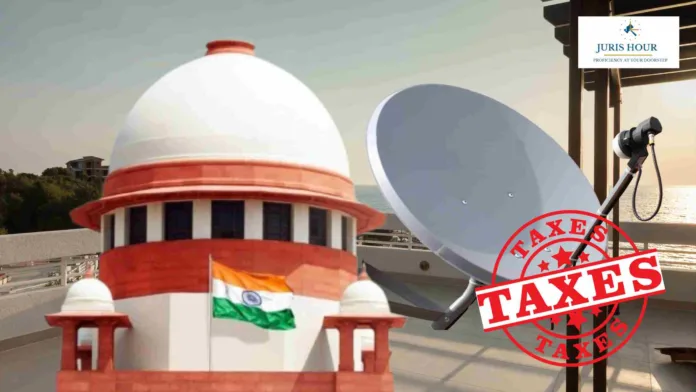The Supreme Court has upheld the constitutional validity of entertainment taxes imposed by state governments on cable and Direct-to-Home (DTH) television services, affirming the legislative competence of states to tax the entertainment component of broadcasting services.
The bench of Justice B.V. Nagarathna and Justice N. Kotiswar Singh ruled that while the Union Government retains the right to levy service tax on the broadcasting aspect, states are within their rights to tax the entertainment element under their jurisdiction. The decision reinforces the principle that different aspects of a single activity can be subject to taxation by both central and state authorities.
DTH Operators’ Pleas Dismissed
The apex court dismissed a series of appeals by major DTH service providers such as Tata Sky (now Tata Play), Dish TV, and Sun Direct. These companies had challenged various state-level entertainment tax laws, contending that such levies were unconstitutional due to the central service tax already imposed on broadcasting services.
Rejecting this argument, the court observed:
“Both Parliament and state legislatures possess the authority to levy service tax and entertainment tax respectively, on different facets of the same transaction.”
The “Aspect Theory” in Taxation
Central to the Court’s 321-page judgment was the application of the “aspect theory”—a constitutional interpretation that allows different taxing authorities to tax distinct components of the same transaction. The Court noted that:
- The Centre can levy tax on the transmission of signals (service aspect);
- The States are empowered to tax the content consumption or entertainment received by viewers.
The Court elaborated that DTH services involve not just transmission but also decryption and presentation of content for consumer entertainment, thus justifying dual taxation.
States’ Laws Upheld; Kerala’s Appeal Allowed
The appeals stemmed from rulings by several High Courts that upheld state entertainment tax laws, including those of Kerala, Delhi, Tamil Nadu, Uttar Pradesh, Punjab, Gujarat, Odisha, Assam, Jharkhand, Rajasthan, and Uttarakhand.
The Supreme Court also reversed a 2012 Kerala High Court judgment that invalidated a provision of the Kerala Tax on Luxuries Act, 1976. The provision had imposed tax on cable operators with over 7,500 subscribers while exempting smaller operators. The top court held that this classification was constitutionally valid and based on a rational distinction.
Retrospective Taxation Curtailed
In a partial relief to operators, the Court held that retrospective application of entertainment tax by the state of Uttar Pradesh was invalid where legislative amendments did not explicitly include DTH services.
The judgment clarified:
“In the absence of a clearly defined taxable event, retrospective taxation cannot be sustained.”
No Shield for DTH Operators
DTH service providers argued that they merely acted as intermediaries between broadcasters and viewers, and hence, should not be liable for a separate entertainment tax. The Court, however, dismissed this contention, stating that the role of DTH operators is integral to the delivery of entertainment, including through the use of set-top boxes and decryption technology.
Case Details
Case Title: State Of Kerala & Another Appellants Versus Asianet Satellite Communications Ltd. & Others
Case No.: CIVIL APPEAL NO.9301 OF 2013
Date: MAY 22, 2025
Read More: GST Conclave on “8 Years of GST – Journey So Far and Challenges Ahead” Held in Noida

